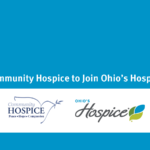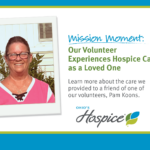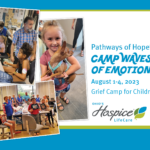
Patients and Physicians Encouraged To Discuss Advance Directives
According to a Kaiser Health Tracking Poll, 89% of adults in the U.S. believe doctors should discuss end-of-life care issues with patients and 81% believe that Medicare should cover the cost of those discussions. Now Medicare does. With the observance of National Healthcare Decisions Day on April 16, patients are encouraged to seek out this discussion with their doctors.
Medicare coverage now includes advance care planning services provided by physicians, as well as other health professionals such as nurse practitioners. The counseling is voluntary, and can take place during annual wellness visits or regular office visits. Ohio’s Hospice of Dayton began an education program in 2015 designed to help primary care physicians prepare for such conversations. A series of physician led educational programs have been held quarterly providing physicians with insights into how to engage in patient-centered discussions about end-of-life care and advance directives. Ohio’s Hospice of Dayton Chief Medical Officer Ruth Thomson, DO, says this will open up opportunities for important conversations between patients and physicians.
“Completion of advance directives can be viewed as a wellness initiative,” Dr. Thomson says. “The ultimate goal is to complete advance care directives when you are healthy.” Initially advance directives, which include a Living Will and Health Care Power of Attorney, should be written to give direction to health care providers in case someone has an unexpected serious illness or injury. Later in life, when individuals have progressive chronic or terminal illness, the focus for completing or updating one’s advance directives should turn more towards spelling out the type of care someone wants as their disease progresses. “I would encourage patients and their families to initiate these discussions with their primary care physicians” states Thomson.
Completing advance directives is a way that individuals decide to be heard regarding their wishes and goals as they consider options for end-of-life care and decide what best matches their personal wishes. The process helps patients identify and define their personal values and goals about health and medical treatment and what care they would like, or not like, to receive in various situations. Patients also have the opportunity to determine whom they would like to make health care decisions on their behalf in the event they cannot make decisions for themselves. This information is documented as advance directives and is shared with family and healthcare professionals to help assure patient end-of-life wishes are honored.
Dr. Thomson believes Medicare coverage for these conversations validates that the time and attention devoted to the topic is important and valuable. “Evidence shows that those without advance directives go through more procedures in the last thirty days of life than those who do have advance directives in place. Unfortunately, regardless of aggressive medical interventions, the final outcome is often the same, but the path to get there is very different.”
Research shows that individuals who have early advance care planning discussions with family and their physician, more often receive the care they want with reduced distress among family members. Thomson notes, “It’s important for people to consider how they want to spend their last days, weeks, or months and have control over their care and treatment.”
To further encourage Advance Directive discussions with doctors, Ohio’s Hospice is sponsoring Decide to be Heard, an informational program and website with resources designed to help individuals develop personal plans for end-of-life.
Author Profile
Latest entries
 Community HospiceJanuary 1, 2024Community Hospice to Join Ohio’s Hospice Strategic Partnership
Community HospiceJanuary 1, 2024Community Hospice to Join Ohio’s Hospice Strategic Partnership #CelebratingLifesStoriesNovember 21, 2023Priesthood, Shelters and Hospice Care: A Life of Service for Barbara Parini
#CelebratingLifesStoriesNovember 21, 2023Priesthood, Shelters and Hospice Care: A Life of Service for Barbara Parini News and UpdatesJuly 28, 2023Ohio’s Hospice Volunteer Experiences Hospice Care as a Loved One
News and UpdatesJuly 28, 2023Ohio’s Hospice Volunteer Experiences Hospice Care as a Loved One Grief SupportFebruary 27, 2023Register Now for Camp Waves of Emotion: Summer Camp for Grieving Children
Grief SupportFebruary 27, 2023Register Now for Camp Waves of Emotion: Summer Camp for Grieving Children

